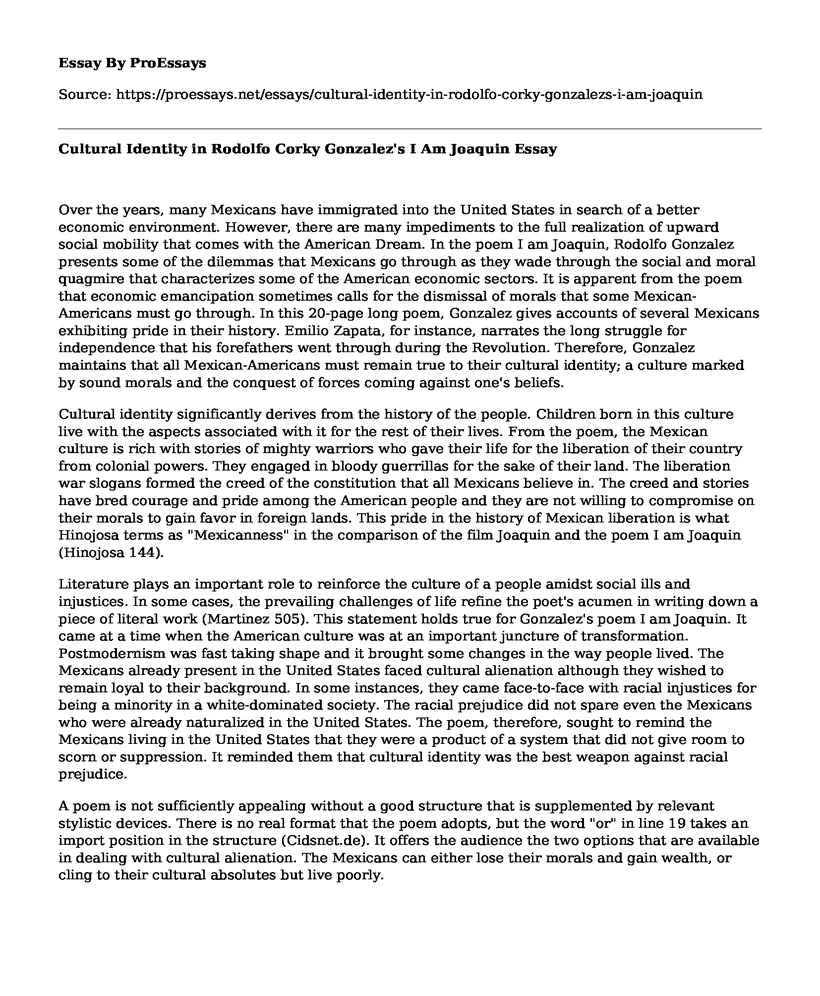Over the years, many Mexicans have immigrated into the United States in search of a better economic environment. However, there are many impediments to the full realization of upward social mobility that comes with the American Dream. In the poem I am Joaquin, Rodolfo Gonzalez presents some of the dilemmas that Mexicans go through as they wade through the social and moral quagmire that characterizes some of the American economic sectors. It is apparent from the poem that economic emancipation sometimes calls for the dismissal of morals that some Mexican-Americans must go through. In this 20-page long poem, Gonzalez gives accounts of several Mexicans exhibiting pride in their history. Emilio Zapata, for instance, narrates the long struggle for independence that his forefathers went through during the Revolution. Therefore, Gonzalez maintains that all Mexican-Americans must remain true to their cultural identity; a culture marked by sound morals and the conquest of forces coming against one's beliefs.
Cultural identity significantly derives from the history of the people. Children born in this culture live with the aspects associated with it for the rest of their lives. From the poem, the Mexican culture is rich with stories of mighty warriors who gave their life for the liberation of their country from colonial powers. They engaged in bloody guerrillas for the sake of their land. The liberation war slogans formed the creed of the constitution that all Mexicans believe in. The creed and stories have bred courage and pride among the American people and they are not willing to compromise on their morals to gain favor in foreign lands. This pride in the history of Mexican liberation is what Hinojosa terms as "Mexicanness" in the comparison of the film Joaquin and the poem I am Joaquin (Hinojosa 144).
Literature plays an important role to reinforce the culture of a people amidst social ills and injustices. In some cases, the prevailing challenges of life refine the poet's acumen in writing down a piece of literal work (Martinez 505). This statement holds true for Gonzalez's poem I am Joaquin. It came at a time when the American culture was at an important juncture of transformation. Postmodernism was fast taking shape and it brought some changes in the way people lived. The Mexicans already present in the United States faced cultural alienation although they wished to remain loyal to their background. In some instances, they came face-to-face with racial injustices for being a minority in a white-dominated society. The racial prejudice did not spare even the Mexicans who were already naturalized in the United States. The poem, therefore, sought to remind the Mexicans living in the United States that they were a product of a system that did not give room to scorn or suppression. It reminded them that cultural identity was the best weapon against racial prejudice.
A poem is not sufficiently appealing without a good structure that is supplemented by relevant stylistic devices. There is no real format that the poem adopts, but the word "or" in line 19 takes an import position in the structure (Cidsnet.de). It offers the audience the two options that are available in dealing with cultural alienation. The Mexicans can either lose their morals and gain wealth, or cling to their cultural absolutes but live poorly.Conclusion
In conclusion, I am Joaquin is a masterpiece through which the poet communicates to people of his kind living under the subjection of retrogressive social laws. It blends sociology and literature to achieve the objectives of the poet in its composition. In a nutshell, it reminds the Mexicans that their history is too rich to trade with social favors that can be genuinely earned through remaining true to their identity.
Works Cited
Hinojosa, Rolando. "I Am Joaquin: Relationships between the Text and the Film." Bilingual Review/La Revista Bilingue 10.2/3 (1983): 142-145.
I Am Joaquin by Rodolfo Gonzales, Department of English, Gymnasium Steglitz Berlin, www.gs.cidsnet.de/englisch-online/diverse/joaquin.htm.
Martinez, Eliud. "I Am Joaquin as Poem and Film: Two Modes of Chicano Expression." The Journal of Popular Culture 13.3 (1980): 505-515.
Cite this page
Cultural Identity in Rodolfo Corky Gonzalez's I Am Joaquin. (2022, Mar 11). Retrieved from https://proessays.net/essays/cultural-identity-in-rodolfo-corky-gonzalezs-i-am-joaquin
If you are the original author of this essay and no longer wish to have it published on the ProEssays website, please click below to request its removal:
- Report on a Classical Music Concert Paper Example
- Milton's L'Allegro and Il Penseroso Essay Example
- Essay Sample on The Hour: Trapped Lives of Women in a Patriarchal Society
- Make Paper Snow Flakes for Christmas Decorations: Process Analysis Essay
- Essay Example on Social Realism in Literature: Common People, Stories, and Places
- Free Essay Example on Learning to Balance Work-Life, School & Family: Overcoming Time Management Obstacles
- Paper Sample on Nurturing Faith: The Impact of Family Dynamics on My Relationship with God







